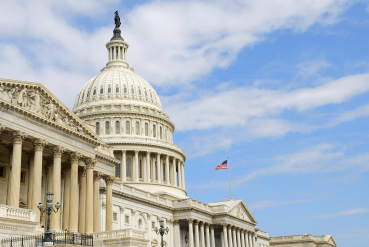 The House Financial Services Committee recently unveiled a new bill aimed at fostering increased private investment. The “JOBS and Investor Confidence Act of 2018,” as the bill is titled, is actually a compilation of 32 individual bills. While the complete list of the respective bills can be found on the House Financial Services Committee’s website, I felt a summary of some of the more important bills (at least in terms of crowdfunding) was warranted.
The House Financial Services Committee recently unveiled a new bill aimed at fostering increased private investment. The “JOBS and Investor Confidence Act of 2018,” as the bill is titled, is actually a compilation of 32 individual bills. While the complete list of the respective bills can be found on the House Financial Services Committee’s website, I felt a summary of some of the more important bills (at least in terms of crowdfunding) was warranted.
While the majority (if not all) of the bills provide for material, and generally beneficial, changes to existing laws, the following bills could really have a significant impact on private investment if passed:
H.R. 2364 – The Investing in Main Street Act

Photo by Kaique Rocha on Pexels.com
This bill looks to amend the Small Business Investment Act of 1968. Specifically this bill proposes increasing the percentage of total assets that an insured bank/financial institution can invest in a “small business investment company” from 5% to 15%, subject to the approval of the respective federal regulator when investing more than 5%. For those that don’t know, a “small business investment company” (also typically referred to as an “SBIC”) is a type of privately-owned investment company that is licensed by the Small Business Administration (SBA). SBAs/SBICs are already responsible for supplying a ton of equity/debt financing to small and emerging businesses.
The fact that this bill, if passed, would triple the total amount of assets that can be invested in/lent to these businesses could have massive positive implications to small/emerging businesses.
H.R. 5877 – The Main Street Growth Act
This bill looks to amend the Security Exchange Act of 1934 to allow for the registration of a new form of exchange (referred to as a “venture exchange”) with the SEC to provide an exchange venue tailored for small and emerging companies. Additionally, the bill: (a) clarifies the approval process to be taken by the SEC with respect to petitioning “venture exchanges;” (b) provides that a “venture exchange” may only act as a marketplace for purchasers/sellers of securities; (c) provides that a “venture exchange” may only trade in securities that are registered (though they may define their own trading procedures, including defining trading increments and carrying out periodic auctions instead of continuous trading); and (d) provides that, other than the foregoing, an approved venture exchange will have the same powers and restrictions of a national securities exchange.
If passed, these new venture exchanges would allow qualifying companies to more readily and easily trade their securities. These types of new exchanges are not only desired, they are downright necessary given the vast need for increased liquidity in the private investment industry.
H.R. 79 – The Helping Angels Lead Our Startups (HALOS) Act
This bill directs the SEC to revise Regulation D to give startups a better chance to market to interested parties without conflicting with securities laws. In particular, the bill requires a revision to the general prohibition against solicitation or advertising of private securities offerings to provide a carve-out for any presentation:
- where the advertising materials don’t reference any specific offering of securities;
- where no specific information regarding an offering of securities by the issuer is communicated or distributed to attendees other than basic information (g. the type and amount of securities being offered, the use of proceeds, etc.);
- which is sponsored by: (a) the U.S., by any state or territory thereof, and/or by any political subdivision/agency of any of the foregoing; (b) a college, university, or other institution of higher education; (c) a nonprofit organization; (d) an “angel investor group” (discussed below) a venture forum, venture capital association, or trade association; and/or (e) any other group, person or entity as the SEC may determine by rule; and
- where the sponsor does not: (a) make investment recommendations or provide advise to attendees; (b) take any active role in the negotiations between the presenting issuer and any attendees; (c) charge attendees (except for basic administrative fees); or (d) receive any compensation that would require the sponsor to register as a broker/dealer.
What makes this bill particularly interesting is that it also applies to presentations sponsored by “angel investor groups” (or investor clubs) which are defined in the bill as a group of accredited investors interested in investing personal capital in early-stage companies who holds regular meetings and defined process for investment and who does not have any association or affiliation with any broker dealer/investment adviser.
If passed, this bill would provide a bright line carve-out allowing issuers to more easily conduct, and participate in, presentations to potential investors.
H.R. 1585 - The Fair Investment Opportunities for Professional Experts Act
Arguably one of the most important and far reaching bills in the group is the “Fair Investment Opportunities for Professional Experts Act.” This bill attempts to amend the definition of “accredited investor” under the the Security Act of 1933 (and Regulation D) to both: (a) provide for an automatic inflation adjustment to the $1,000,000 net worth qualifier; and (b) include the following as a NEW category of “accredited investor”:
“any natural person who is currently licensed or registered as a broker or investment adviser by the Commission, the Financial Industry Regulatory Authority, or an equivalent self-regulatory organization (as defined in section 3(a)(26) of the Securities Exchange Act of 1934), or the securities division of a State or the equivalent State division responsible for licensing or registration of individuals in connection with securities activities.”

Photo by Pixabay on Pexels.com
The above new category is being included without reference to any income or net worth requirements. Put another way, any person who meets one or more of the above qualifications would be deemed an “accredited investor” regardless of how much money they make/have. Given the fact that the definition of “accredited investor” has always some form of included monetary qualifier, this is a potentially monumental change in precedent.
It should be noted that the proposed bill also includes the following category:
“any natural person the Commission determines, by regulation, to have demonstrable education or job experience to qualify such person as having professional knowledge of a subject related to a particular investment, and whose education or job experience is verified by the Financial Industry Regulatory Authority or an equivalent self-regulatory organization (as 16 defined in section 3(a)(26) of the Securities Exchange Act of 1934)”
At first blush this category may seem like an even bigger deal than the above qualification. However, except for the fact that it makes no reference to any monetary qualifier, it really isn’t that much different, or more expansive, than the existing language of 15 U.S.C. 77b(a)(15)(ii) which provides an exemption for:
“any person who, on the basis of such factors as financial sophistication, net worth, knowledge, and experience in financial matters, or amount of assets under management qualifies as an accredited investor under rules and regulations which the Commission shall prescribe”
Further, in reading the original and revised versions above, the new language may actually be less useable than the original due to the addition of the phrase: “to qualify such person as having professional knowledge of a subject related to a particular investment.” That can really be taken any number of ways from the most expansive (e.g. having a legal or accounting background) to the least expansive (e.g. needing experience in the restaurant industry to make an investment in a restaurant).
One very important and less noticeable feature of this bill is that it specifically requires a corresponding amendment to be made to the definition of “accredited investor” under Regulation D to include both of the above mentioned categories. While the definition of accredited investor under Regulation D has always been corollary to that under the Securities Act, they have never been exactly the same. In particular, the definition of accredited investor under Regulation D currently does NOT include any open-ended language like the provisions above which allow the SEC to proscribe new classes of accredited investors simply by rule. Creating a more open-ended qualification standard under Regulation D like that proposed in the bill (even if limited by the language discussed above) would allow the SEC, on their own and without subsequent house/congress approval, to amend the definition from time to time to include new classes of, and/or new tests for those attempting to qualify as, accredited investors.

Photo by Designecologist on Pexels.com
This bill is attempting to push against decades of precedent and, if passed, has the potential to materially alter how investors view and participate in private investments. While the devil would certainly be in the details with respect to any subsequent SEC rules/regulations made with respect to the “accredited investor” definition, because this definition is at the very heart of all private securities laws the potential far reaching effects of the bill are HUGE.
One thing I should note in parting is that the bill is not very clear in the amendments to be made to Regulation D, stating only that “Commission shall revise the definition of accredited investor under Regulation D (17 CFR 230.501 et seq.) to conform with the amendments made” to the Securities Act. Particularly, it is unclear whether the word “conform” is to be read to require the Commission to completely do away with the existing categories of accredited investors under Regulation D to make the definitions identical (which would be a BAD idea) or simply add the new categories to the existing categories of accredited investors under Regulation D. I suspect it’s the later but that should be made clearer before final approval.
H.R. 6380, Crowdfunding Amendments Act
This bill creates a carve-out to the Investment Company Act of 1940 to allow for the creation and use of a special purpose investment vehicle under Regulation Crowdfunding under 4(a)(6) of the Securities Act of 1933. As most people know, currently in a Regulation Crowdfunding offering a special purpose investment vehicle cannot be used (at least not without satisfying the requirements of the Investment Company Act of 1940) and investors need to invest directly in the respective company. The primary issue is that under the Investment Company Act of 1940 a company which is created to invest (or which otherwise solely/primarily invests) in the securities of another company is an investment company for all purposes of the Act unless it falls within one of the exemptions of the Act. As a special purpose investment vehicle would meet this standard and be considered an investment company under the act, a clear exemption would be needed to take it out of the provisions of the Act. This bill attempts to create that exemption.
Particularly this bill seeks to amend the Investment Company Act of 1940 to provide an exemption for a “crowdfunding vehicle.” As defined in the bill, a “crowdfunding vehicle” is a company who: (a) has a purpose that is limited to acquiring, holding, and disposing of securities issued by a single company in one or more transactions made under section 4(a)(6) of the Securities Act of 1933; (b) does not receive compensation for such actions; (c) only issues 1 class of securities; (d) is current with reporting requirements; and (e) is advised by an investment adviser (who discloses any fees to the investors of the company and obtains approval from investors with any fee increases).
One of the main problematic issues with Regulation Crowdfunding is the inability to be able to use special purpose investment vehicle. While I think the included requirement that an investment adviser be involved is unnecessary and might ultimately prove problematic, if passed this bill will at least make the use of special purpose investment vehicles possible.
Conclusion
The JOBS and Investor Confidence Act of 2018 is a unique compilation of bills and it will be interesting to see how it moves through the Senate and whether any of the component bills gets amended/removed. Also, it should be specifically noted that the JOBS and Investor Confidence Act of 2018 does not include HR 4263 - The Regulation A+ Improvement Act of 2017, the bill which attempts to, among other things, increase the offering cap for Regulation A offerings to $75 Million.
